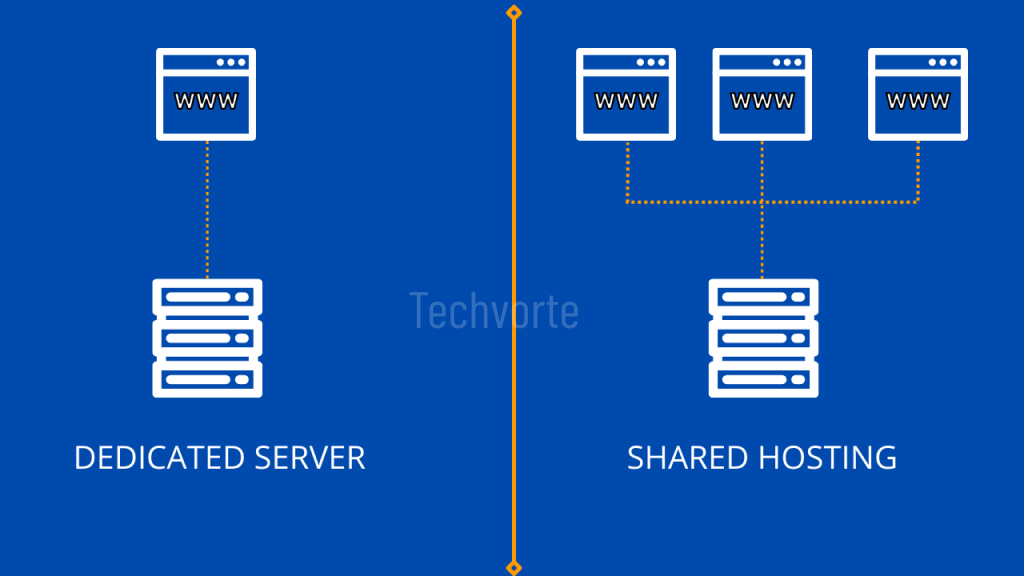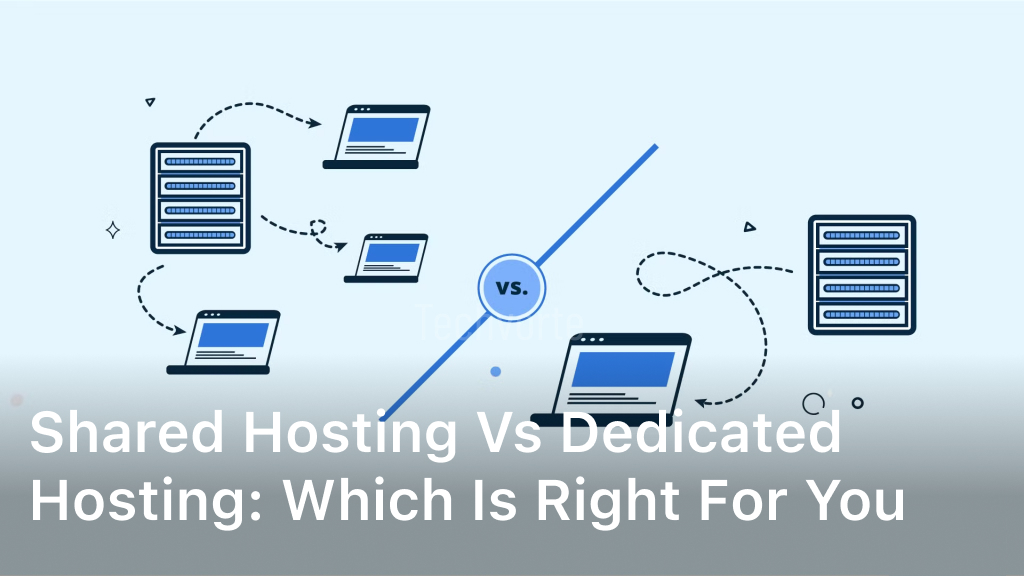Welcome to our comprehensive guide on shared hosting and dedicated hosting – two popular web hosting options for businesses and individuals looking to establish an online presence. In this article, we will explore the key differences between shared hosting and dedicated hosting, considering important factors such as cost, performance, security, scalability, and comparisons with other hosting types like VPS and cloud hosting.
Shared hosting, as the name suggests, involves sharing server resources with multiple websites. It is an affordable option that allows you to get your website up and running quickly without breaking the bank. We will delve into the benefits of shared hosting, including its cost-effectiveness, ease of use, and the ability to share resources with other websites while also considering potential drawbacks such as limited control and the need to address security concerns.
On the other hand, dedicated hosting offers superior performance, security, and scalability by providing a dedicated server exclusively for your website. We will explore the advantages of dedicated hosting, including enhanced performance, the ability to handle high traffic volumes, and the ability to protect sensitive data. We will also discuss how dedicated hosting aligns with scalability requirements as your website grows.
Furthermore, we will compare shared hosting with other hosting solutions, such as VPS (Virtual Private Server) hosting and cloud hosting, to help you make an informed decision based on resource allocation, scalability, and costs. This comparison will enable you to determine which hosting option best suits your specific needs and goals.
In conclusion, choosing between shared hosting and dedicated hosting requires careful consideration of your website’s requirements, budget, security needs, and expected traffic volumes. By evaluating the benefits, limitations, and comparisons presented in this article, you can make a well-informed decision that aligns with your web hosting objectives. Let’s start exploring the world of web hosting and find the perfect fit for your online presence.

Shared Hosting: Benefits and Considerations
When it comes to web hosting, shared hosting is a popular choice for many website owners. It offers a range of benefits, including affordability, ease of use, and the ability to share resources with other websites. However, there are also a few considerations to keep in mind.
Affordability
One of the main advantages of shared hosting is its cost-effectiveness. Shared hosting plans typically come at a lower price point compared to dedicated hosting options. This makes it an excellent choice for small businesses or individuals with tight budgets.
Easy to Use
Shared hosting services are designed to be user-friendly, even for those who are not experienced in website management. With a shared hosting plan, you won’t need any technical knowledge or server administration skills. The hosting provider takes care of server maintenance, updates, and security.
Resource Sharing
Shared hosting allows multiple websites to share the same server and its resources. This means that the server’s computing power, storage, and bandwidth are divided among the websites hosted on it. Resource sharing enables hosting providers to offer affordable plans while still providing sufficient resources for most small to medium-sized websites.
Drawbacks to Consider
Limited Control
One potential drawback of shared hosting is that you have limited control over server settings and configurations. Since you are sharing the server with other websites, you may not have the flexibility to customize certain elements to meet your specific needs. This can be a consideration for websites that require a high degree of customization or have specific software requirements.
Potential Security Concerns
Another consideration with shared hosting is the potential for security risks. If one website hosted on the shared server experiences a security breach or malware infection, it could potentially affect the other websites as well. However, reputable hosting providers implement robust security measures and regularly monitor their servers to minimize these risks.
Overall, shared hosting is a cost-effective option that provides an easy-to-use platform with resource sharing benefits. However, it’s important to carefully evaluate your website’s specific needs and weigh the benefits against the potential drawbacks to make an informed decision.
| Shared Hosting Benefits | Shared Hosting Considerations |
|---|---|
| Affordable | Limited Control |
| Easy to Use | Potential Security Concerns |
| Resource Sharing |
Dedicated Hosting: Advantages and Performance
When it comes to web hosting, dedicated hosting offers a range of advantages that can significantly enhance your website’s performance, security, and scalability. With dedicated hosting, you have an entire server dedicated solely to your website, ensuring optimal resource allocation and unparalleled control over your hosting environment.
Enhanced Performance
One of the primary benefits of dedicated hosting is its exceptional performance. Unlike shared hosting, where resources are shared among multiple websites, dedicated servers are exclusively reserved for your website. This means that you have access to the full processing power, memory, and storage capacity of the server, resulting in faster loading speeds, improved response times, and an overall better user experience for your visitors.
Robust Security
Dedicated hosting provides robust security features that help protect your website and sensitive data. With a dedicated server, you have complete control over the security measures implemented, ensuring that your website’s privacy and integrity are maintained. Additionally, dedicated hosting reduces the risk of security breaches that can occur in shared hosting environments, where one compromised website can affect others.
Scalability for Growth
As your online presence grows, dedicated hosting allows for easy scalability to accommodate increasing traffic volumes and resource demands. With a dedicated server, you have the flexibility to upgrade hardware, increase storage space, and enhance server capabilities to align with your evolving business needs. This scalability ensures that your website can handle high traffic periods without compromising performance or user experience.
With its advantages in performance, security, and scalability, dedicated hosting provides a solid foundation for your website’s success. Whether you have a high-traffic e-commerce store, a media-rich website, or require strict security measures, dedicated hosting offers the resources and control necessary to meet your specific requirements.
Shared Hosting vs VPS and Cloud Hosting: Comparisons
In today’s digital landscape, choosing the right hosting solution is essential for the success of your website. While shared hosting is a popular choice for many, it’s important to consider alternative options like VPS (Virtual Private Server) hosting and cloud hosting. In this section, we will compare shared hosting with these alternatives, helping you make an informed decision based on your unique needs.
Resource Allocation
Shared hosting involves sharing server resources with multiple websites, which can sometimes result in limited resources and slower performance. On the other hand, VPS hosting offers a dedicated portion of server resources, providing more control and scalability. Cloud hosting, on the other hand, utilizes a network of interconnected servers, allowing for dynamic allocation of resources based on demand.
Scalability
When it comes to scalability, shared hosting may have limitations due to its resource-sharing nature. However, VPS hosting offers more scalability as you have the ability to upgrade your resources when needed, ensuring your website can handle increased traffic and resource demands. Cloud hosting, with its flexible and scalable infrastructure, allows you to easily scale resources up or down, giving you the ability to manage sudden spikes or drops in traffic.
Cost
Shared hosting is often the most cost-effective option, making it an attractive choice for small businesses and individuals with budget constraints. VPS hosting generally costs more than shared hosting but provides increased control and performance. Cloud hosting can have variable costs based on usage, but it offers unmatched flexibility and scalability.
Let’s see a comparison table below for a quick overview of the key differences:
| Hosting Option | Resource Allocation | Scalability | Cost |
|---|---|---|---|
| Shared Hosting | Shared with multiple websites | Limited | Affordable |
| VPS Hosting | Dedicated portion of server resources | Highly scalable | Higher cost than shared hosting |
| Cloud Hosting | Utilizes a network of servers | Easily scalable | Variable costs based on usage |
After considering the differences in resource allocation, scalability, and cost, you can make an informed decision based on your specific needs and priorities. Whether it’s the affordability and simplicity of shared hosting, the control and scalability of VPS hosting, or the flexibility and resilience of cloud hosting, there’s a solution that’s right for you. Choose the hosting option that aligns with your website’s requirements and growth plans, and take your online presence to new heights.
Conclusion
When it comes to choosing the right hosting option for your website, the decision between shared hosting and dedicated hosting requires careful consideration. By evaluating the benefits and drawbacks of each, you can make an informed choice that aligns with your specific needs and goals.
Shared hosting offers several advantages, including its affordability and ease of use. With shared hosting, you can benefit from sharing server resources with other websites, making it a cost-effective option for smaller businesses and individuals with limited budgets. However, it’s important to note that shared hosting also has its limitations, such as limited control and potential security vulnerabilities due to sharing resources.
On the other hand, dedicated hosting provides enhanced performance, security, and scalability. With a dedicated server solely dedicated to your website, you can expect faster loading speeds, handle high traffic volumes, and safeguard sensitive data. While dedicated hosting offers numerous advantages, it is often more expensive than shared hosting, making it a better fit for larger businesses and websites with high traffic demands.
It’s also worth considering alternative options like VPS and cloud hosting. Virtual Private Server (VPS) hosting combines the affordability of shared hosting with the scalability and flexibility of dedicated hosting. Cloud hosting, on the other hand, offers unmatched scalability and reliability, as resources are distributed across multiple servers. Evaluating these alternatives alongside shared and dedicated hosting will help you make an informed decision.
In conclusion, consider your website’s specific requirements, budget, security needs, and expected traffic volumes when choosing between shared hosting and dedicated hosting. By carefully evaluating the benefits and considerations of each option, you can select the hosting solution that best suits your web hosting goals and objectives.
FAQ
What is the difference between shared hosting and dedicated hosting?
Shared hosting involves multiple websites sharing the same server and its resources, while dedicated hosting provides a single server exclusively dedicated to one website.
What are the benefits of shared hosting?
Shared hosting is typically more affordable than dedicated hosting, and it is easy to set up and manage. It allows websites to share server resources, ensuring cost-effectiveness for small businesses and personal websites.
What are the advantages of dedicated hosting?
Dedicated hosting offers enhanced performance, security, and scalability. With a dedicated server, websites have exclusive access to server resources, resulting in faster loading speeds, better handling of high traffic volumes, and increased data protection.
How does shared hosting compare to VPS and cloud hosting?
Shared hosting differs from VPS and cloud hosting in resource allocation and scalability. While shared hosting involves sharing resources with other websites, VPS hosting offers dedicated virtual resources, and cloud hosting allows for virtually unlimited scalability and resource availability.





